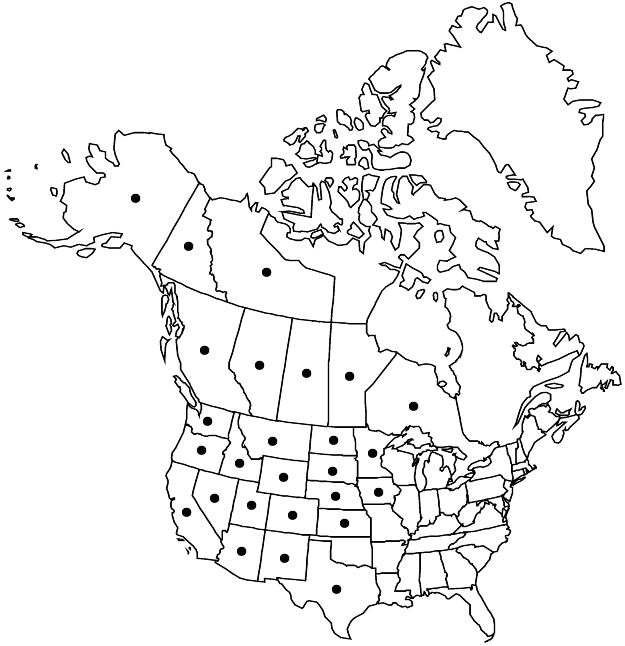Difference between revisions of "Amelanchier alnifolia"
Fam. Nat. Syn. Monogr. 3: 147. 1847.
FNA>Volume Importer |
FNA>Volume Importer |
||
| Line 15: | Line 15: | ||
|name=Aronia alnifolia | |name=Aronia alnifolia | ||
|authority=Nuttall | |authority=Nuttall | ||
| + | |rank=species | ||
|publication_title=Gen. N. Amer. Pl. | |publication_title=Gen. N. Amer. Pl. | ||
|publication_place=1: 306. 1818 | |publication_place=1: 306. 1818 | ||
| Line 31: | Line 32: | ||
|distribution=w North America. | |distribution=w North America. | ||
|discussion=<p>Varieties 3 (3 in the flora).</p><!-- | |discussion=<p>Varieties 3 (3 in the flora).</p><!-- | ||
| − | --><p><i>Amelanchier alnifolia</i> is widespread and polymorphic, and its taxonomic and geographic limits have been viewed differently. L. Cinq-Mars (1971) considered this species to range eastward to the Gaspé Peninsula. Disagreements about the boundary between <i>A. alnifolia</i> and <i>A. humilis</i> are evident in herbarium specimen annotations. The distinctness of the varieties of <i>A. alnifolia</i> has also been questioned. G. N. Jones (1946) treated the three varieties recognized here as distinct species and noted that the leaves of < | + | --><p><i>Amelanchier alnifolia</i> is widespread and polymorphic, and its taxonomic and geographic limits have been viewed differently. L. Cinq-Mars (1971) considered this species to range eastward to the Gaspé Peninsula. Disagreements about the boundary between <i>A. alnifolia</i> and <i>A. humilis</i> are evident in herbarium specimen annotations. The distinctness of the varieties of <i>A. alnifolia</i> has also been questioned. G. N. Jones (1946) treated the three varieties recognized here as distinct species and noted that the leaves of <i></i>var.<i> alnifolia</i> and <i></i>var.<i> semiintegrifolia</i> (A. florida) are virtually indistinguishable, and, although petal lengths of the two do not overlap, occasional larger-flowered <i></i>var.<i> alnifolia</i> and occasional smaller-flowered <i></i>var.<i> semiintegrifolia</i> occur, so the petal length distinction is not an absolute one. Geographically these two varieties are largely separate, with <i></i>var.<i> alnifolia</i> occurring in the Great Plains and Rocky Mountains and <i></i>var.<i> semiintegrifolia</i> on the Pacific slopes of mountains from Alaska to northern California.</p><!-- |
--><p><i>Amelanchier alnifolia</i> is thought to hybridize with <i>Sorbus scopulina</i> (x\Amelasorbus jackii Rehder).</p> | --><p><i>Amelanchier alnifolia</i> is thought to hybridize with <i>Sorbus scopulina</i> (x\Amelasorbus jackii Rehder).</p> | ||
|tables= | |tables= | ||
| Line 63: | Line 64: | ||
-->{{#Taxon: | -->{{#Taxon: | ||
name=Amelanchier alnifolia | name=Amelanchier alnifolia | ||
| − | |||
|authority=(Nuttall) Nuttall ex M. Roemer | |authority=(Nuttall) Nuttall ex M. Roemer | ||
|rank=species | |rank=species | ||
| Line 75: | Line 75: | ||
|publication year=1847 | |publication year=1847 | ||
|special status=Endemic | |special status=Endemic | ||
| − | |source xml=https://jpend@bitbucket.org/aafc-mbb/fna-data-curation.git/src/ | + | |source xml=https://jpend@bitbucket.org/aafc-mbb/fna-data-curation.git/src/f50eec43f223ca0e34566be0b046453a0960e173/coarse_grained_fna_xml/V9/V9_1117.xml |
|subfamily=Rosaceae subfam. Amygdaloideae | |subfamily=Rosaceae subfam. Amygdaloideae | ||
|tribe=Rosaceae tribe Gillenieae | |tribe=Rosaceae tribe Gillenieae | ||
Revision as of 22:38, 16 December 2019
Shrubs, 1–12 m. Stems 1–50, solitary or colonial. Leaves mostly unfolded; petiole (3–)6.8–19.1(–28) mm; blade usually elliptic to oval to suborbiculate, sometimes quadrangular, (14–)24–47(–67) × (7–)17–36(–55) mm, base usually subcordate to truncate, sometimes ± tapering or ± cuneate, each margin with 0–3(–9) teeth on proximal 1/2 and (0–)3–5(–8) teeth in distalmost cm, largest teeth more than 1 mm, apex rounded to truncate or occasionally acute or mucronate, abaxial surface sparsely to densely hairy (or glabrous) by flowering, sparsely to moderately hairy (or glabrous) later, adaxial glabrous or sparsely (moderately) hairy later. Inflorescences (4–)6–11(–16)-flowered, (8–)14–43(–62) mm. Pedicels: (0 or)1 or 2(or 3) subtended by a leaf, proximalmost (2–)3–20(–29) mm. Flowers: sepals erect to recurved after flowering, (1.4–)2.2–4(–4.9) mm; petals oblanceolate to oval or obovate to elliptic, (5.7–)9.5–14(–18.8) × (2.2–)3.3–5.2(–6.6) mm; stamens (10–)15–21(–22); styles (3 or)4 or 5(or 6), (1.3–)2–2.9(–3.9) mm; ovary apex moderately to densely hairy (or glabrous). Pomes black or purple, 8–15 mm diam.
Distribution

w North America.
Discussion
Varieties 3 (3 in the flora).
Amelanchier alnifolia is widespread and polymorphic, and its taxonomic and geographic limits have been viewed differently. L. Cinq-Mars (1971) considered this species to range eastward to the Gaspé Peninsula. Disagreements about the boundary between A. alnifolia and A. humilis are evident in herbarium specimen annotations. The distinctness of the varieties of A. alnifolia has also been questioned. G. N. Jones (1946) treated the three varieties recognized here as distinct species and noted that the leaves of var. alnifolia and var. semiintegrifolia (A. florida) are virtually indistinguishable, and, although petal lengths of the two do not overlap, occasional larger-flowered var. alnifolia and occasional smaller-flowered var. semiintegrifolia occur, so the petal length distinction is not an absolute one. Geographically these two varieties are largely separate, with var. alnifolia occurring in the Great Plains and Rocky Mountains and var. semiintegrifolia on the Pacific slopes of mountains from Alaska to northern California.
Amelanchier alnifolia is thought to hybridize with Sorbus scopulina (x\Amelasorbus jackii Rehder).
Selected References
None.
Lower Taxa
Key
| 1 | Ovary apices glabrous (or sparsely hairy); shrubs 1–2(–4) m. | Amelanchier alnifolia var. pumila |
| 1 | Ovary apices moderately to densely hairy (or glabrous); shrubs or trees, 1–12 m | > 2 |
| 2 | Inflorescences (8–)26–43(–62) mm; proximalmost pedicels (5–)8–16(–29) mm. | Amelanchier alnifolia var. alnifolia |
| 2 | Inflorescences (8–)14–26(–35) mm; proximalmost pedicels (2 or)3–8(–13) mm. | Amelanchier alnifolia var. semiintegrifolia |